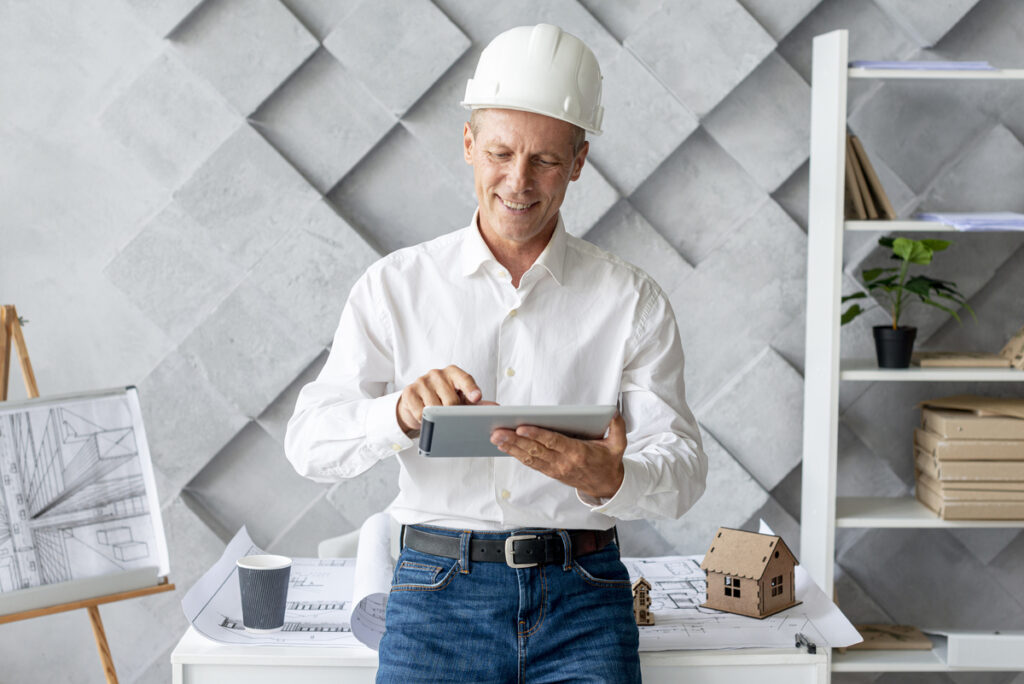Smart construction solution are revolutionizing how projects are designed, carried out, and maintained in the quickly changing construction industry. Building information modeling (BIM), the Internet of Things (IoT), AI in construction, and augmented reality (AR) are some of the key technologies in smart construction solutions that are changing traditional construction procedures into extremely productive, economical, and environmentally friendly processes.
These developments ensure that projects are finished on schedule and within budget by enabling real-time data collecting, predictive analytics, and improved stakeholder collaboration. Industry personnel now need to understand and leverage these technologies more than ever because there is a growing demand for smarter, more robust infrastructure. This article explores the main technologies enabling smart construction solutions, emphasizing the advantages and uses of these technologies in contemporary building projects.
Table of Contents
Top 10 Key Technologies in Smart Construction Solution
As 2025 approaches, the construction sector will continue to develop dynamically thanks to a variety of key technologies in smart construction solutions. These revolutionary developments are transforming conventional building methods and clearing the path for a future that is more productive, sustainable, and cooperative.
The following 10 major key technologies in smart construction solutions will still influence the building market:
1. Dominance of Building Information Modeling (BIM)
The construction sector is undergoing a change because to Building Information Modeling (BIM) technology, which allow for comprehensive 3D modeling of buildings. By combining all project components into a single digital platform, this innovation improves design visualization, project management, and teamwork. BIM is widely used in large-scale projects because it helps identify problems early, enables informed decision-making by simulating many scenarios, and increases the sustainability and efficiency of the project as a whole.
Its capacity to optimize scheduling, resource allocation, and planning lowers expenses and minimizes delays while establishing new benchmarks for the management of building projects. BIM is becoming more and more important in today’s construction environment because of its ability to improve stakeholder communication and streamline project workflows.
Suggested article to read: World’s 10 Best BIM Projects; 2025 Review | Scan to BIM Solutions; 2025 Ultimate Guide
2. Online Tendering Platforms and Construction Data Management Software Solutions
The construction sector is rapidly adopting cloud-based communication tools and construction management software, which is transforming efficiency and production. By enabling team members to communicate in real time, no matter where they are in the world, these key technologies in smart construction solutions improve collaboration. Cloud-based solutions optimize workflow procedures and cut down on administrative overhead expenses by enabling seamless document exchange and centralized project management.
Project managers are better able to distribute resources, keep an eye on developments, and make well-informed judgments. Cloud systems’ scalability and accessibility facilitate agile project management by enabling quick adjustments and guaranteeing that building projects remain within budget and schedule limits. Cloud-based key technologies in smart construction solutions are essential for streamlining operations and spurring sector innovation as construction companies adopt digital transformation at an increasing rate.

Suggested article to read: Benefits of Cloud-Based Construction Data Management Solutions | Innovations in Construction Data Management: Trends to Watch (2025)
3. Modular Construction and Prefabrication in Construction
The utilization of modular and prefabricated construction techniques is becoming more and more popular due to their capacity to improve cost-effectiveness, minimize waste, and accelerate construction schedules. By producing building components off-site in controlled environments, these key technologies in smart construction solutions guarantee greater accuracy and caliber. Off-site manufacturing is becoming more and more popular in the construction industry since it enables simultaneous on-site assembly and preparation.
This strategy cuts down on building time and causes the least amount of disturbance to nearby residents. Construction projects can be completed more quickly, more affordably, and with greater sustainability when modular and prefabricated key technologies in smart construction solutions are used. As a result, developers and contractors looking for cost-effective and ecologically responsible building solutions choose these methods.
4. Green and Sustainable Construction Technology
The term “Smart construction technology” refers to key technologies in smart construction solutions used in the building process with the goal of minimizing negative environmental effects and maximizing energy efficiency. To reduce resource consumption and carbon footprint, this method combines green building materials, renewable energy sources, and creative construction approaches.
Water conservation techniques, the utilization of recyclable materials, effective HVAC in buildings, and passive design tactics are important components. Eco-friendly construction prioritize sustainability, which reduces operating costs and improves tenant health and well-being. Adopting green building key technologies in smart construction solutions is in line with international initiatives to reduce climate change and produce more resilient and ecologically conscious built environments.
Suggested article to read: Sustainable Construction; Comprehensive Guide 2025 | Top 7 Sustainable Architecture Projects
5. Smart Construction and IoT
The Internet of Things (IoT) is causing a significant revolution on construction sites. More and more sensors and networked devices are being used to track cargo, keep an eye on the condition of equipment, improve safety procedures, and expedite project management. The incorporation of key technologies in smart construction solutions are becoming more and more significant as these Internet of Things-capable gadgets offer real-time data insights.
IoT enhances overall operational efficiency, optimizes resource allocation, and enables predictive maintenance by collecting and evaluating data from diverse on-site operations. This movement toward data-driven, networked building methods points to a change in construction management that is more intelligent and adaptable and can keep up with the changing needs of contemporary projects.
6. Drones and UAVs
In the construction business, drones in construction are being used more and more for site surveys, progress tracking, and airborne inspections. By minimizing the necessity for personnel to approach dangerous locations and by offering real-time data and insights, they greatly improve safety. Drone-performed aerial inspections provide comprehensive building site monitoring, spotting possible risks or problems without endangering human safety.
By taking clear photos and videos, drones also make it easier to track progress and give project managers precise information about the state of their work. Their capacity to collect data in real-time guarantees prompt decision-making, which eventually enhances project efficiency and safety procedures on building sites.

7. Machine Learning and AI in Construction
Among the industries employing AI and machine learning technologies are data analytics, predictive maintenance, and project optimization. These key technologies in smart construction solutions help reduce costs and delays for construction companies by facilitating data-driven decision-making. With the use of AI algorithms, predictive maintenance keeps an eye on the condition of equipment and anticipates malfunctions before they happen.
Artificial intelligence (AI) is used in project optimization to evaluate enormous volumes of data, find inefficiencies, optimize resource allocation, and streamline workflows—all of which lead to more effective project execution. Machine learning-powered data analytics extracts useful information from large, complicated datasets, enabling construction managers to more precisely anticipate project schedules, financial requirements, and possible hazards.
Suggested article to read: Artificial Intelligence or AI in Building; Guide to 2025 | Artificial Intelligence or AI in Architecture; Guide to 2025
8. Virtual Reality (VR) and Augmented Reality (AR) in Construction
Applications for AR and VR technology are expanding, and some of them include project planning, training, and design visualization. Stakeholders can experience construction projects in a virtual setting, which enhances collaboration and reduces mistakes. With the help of these key technologies in smart construction solutions, team members can visualize intricate ideas and spot possible problems before they become problems.
During the construction phase, this proactive strategy greatly minimizes costly changes and delays. Additionally, by providing workers with a safe, controlled virtual environment in which to practice skills and processes, AR and VR help to support more effective training programs. Employee learning and retention are improved by this practical experience, which also makes them more equipped for work in the real world.
9. Automation in Construction, Robotics, and 3D Printing
Bricklaying, concrete pouring, and site cleanup are among the duties that are being performed by robots and automation. In the construction industry, 3D printing is still in use. These key technologies in smart construction solutions increase productivity and solve the manpower scarcity in the building sector. The world’s first completely functional 3D-printed office, called the Office of the Future, is located in Dubai, for instance.
10. Supply Chain Management with Blockchain in Construction
The building supply chain’s traceability and transparency have been greatly improved by blockchain technology. It guarantees that each transaction and movement of materials is documented and verifiable by offering an immutable, secure ledger. The heightened level of openness serves to mitigate conflicts and disputes among stakeholders by granting all parties equal access to precise information.
Furthermore, the strong security features of blockchain guard against fraud by almost making it impossible to change records covertly. By guaranteeing the authenticity and provenance of building materials, these key technologies in smart construction solution also makes sure that they adhere to strict requirements and laws.

Conclusion
The construction industry is undergoing a change with the adoption of key technologies in smart construction solutions. In addition to improving project efficiency and cost-effectiveness, Building Information Modeling (BIM), the Internet of Things (IoT), Artificial Intelligence (AI), and Augmented Reality (AR) are also encouraging sustainability and resilience. By enabling better planning, monitoring in real time, and decision-making, these technologies guarantee that construction projects satisfy the changing needs of the twenty-first century.
Professionals who stay up to date on these important technologies will be better able to provide superior building solutions as the industry embraces digital transformation. Key technologies in smart construction solutions that optimize each step of the building process will be the foundation of construction in the future, opening the door to a built environment that is more sustainable and productive.
Suggested article for reading:
The Future of Smart Construction; 2025 Review
Smart Construction; Comprehensive Guide 2025
Smart Construction: Top 7 IoT Applications
Resources:
ForTender | ServiceChannel | SmartConstruction | IntellectSoft
For all the pictures: Freepik





